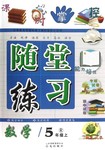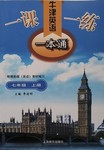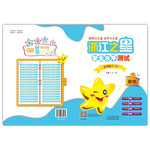题目内容
Helen was much kinder to her youngest child than she was to the others, ,of course,made the others jealous.
A.who B.that C.which D.what
C
【解析】
试题分析:句意:海伦对她最小的孩子比别的孩子好,当然这使得其他孩子很嫉妒。分析结构可知此处是非限制性定语从句,排除BD选项,从句中缺少主语,指代前句话的内容,故答案选C。
考点:考查定语从句。

练习册系列答案
 课时掌控随堂练习系列答案
课时掌控随堂练习系列答案 一课一练一本通系列答案
一课一练一本通系列答案 浙江之星学业水平测试系列答案
浙江之星学业水平测试系列答案
相关题目
 ing this epic journey.First of all, he wanted to use the trip to raise money for charity, which he did.He raised £70,000 for the British charity, Oxfam.White's second reason for making the trip was to break the world record and become the fastest person to cycle around the world.He is still waiting to find out if he has broken the record or not.
ing this epic journey.First of all, he wanted to use the trip to raise money for charity, which he did.He raised £70,000 for the British charity, Oxfam.White's second reason for making the trip was to break the world record and become the fastest person to cycle around the world.He is still waiting to find out if he has broken the record or not. d be wonderful to see again, but a calamity(灾难) can do strange things to people.It occurred to me the other day that I might not have come to love life as I do if I hadn't been blind.I believe in life now.I am not so sure that I would have believed in it so deeply, otherwise.I don't mean that I would prefer to go without my eyes.I simply mean that the loss of them made me appreciate the more what I had left.
d be wonderful to see again, but a calamity(灾难) can do strange things to people.It occurred to me the other day that I might not have come to love life as I do if I hadn't been blind.I believe in life now.I am not so sure that I would have believed in it so deeply, otherwise.I don't mean that I would prefer to go without my eyes.I simply mean that the loss of them made me appreciate the more what I had left. The hardest lesson I had to learn was to believe in myself.That was basic.If I hadn't been able to do that, I would have collapsed and become a chair rocker on the front porch for the rest of my life.When I say belief in myself I am not talking about simply the kind of self confidence that helps me down an unfamiliar staircase alone.That is part of it.But I mean something bigger than that: an assurance that I am, despite imperfections, a real, positive person; that somewhere in the sweeping, intricate(错综复杂的) pattern of people there is a special place where I can make myself fit.
The hardest lesson I had to learn was to believe in myself.That was basic.If I hadn't been able to do that, I would have collapsed and become a chair rocker on the front porch for the rest of my life.When I say belief in myself I am not talking about simply the kind of self confidence that helps me down an unfamiliar staircase alone.That is part of it.But I mean something bigger than that: an assurance that I am, despite imperfections, a real, positive person; that somewhere in the sweeping, intricate(错综复杂的) pattern of people there is a special place where I can make myself fit. How to adjust himself to reality.
How to adjust himself to reality.  ement offered by the man _____
ement offered by the man _____ orning.As our body temperature starts to rise just before awakening in the morning and continues to increase until midday,our memory,alertness and concentration gradually improve.
orning.As our body temperature starts to rise just before awakening in the morning and continues to increase until midday,our memory,alertness and concentration gradually improve. ery difficult in our modem society.
ery difficult in our modem society. tween noon and 4 pm.
tween noon and 4 pm. good for us.
good for us. ing face to face.
ing face to face.